Granma 299
United States at the Crossroads

United States at the Crossroads
As the crisis in the U.S. deepens and the protests following George Floyd’s assassination take on a broader tone, old and new wounds of a society in need of profound change come to light
—————————————————————————–
Author: Raúl Antonio Capote | internacionales@granma.cu
Translated and edited by Walter Lippmann for CubaNews.
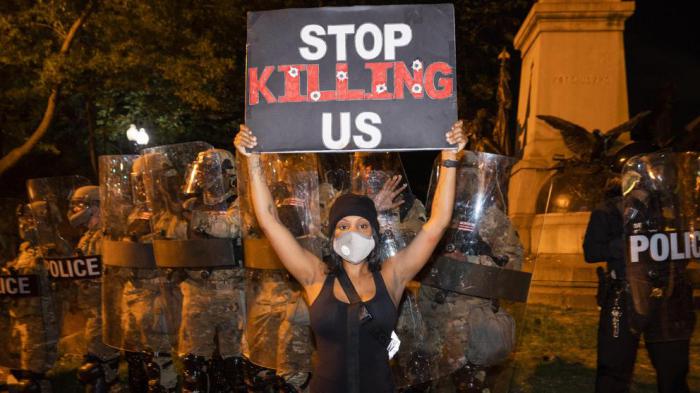
The protests take on a broader tone, bringing out old and new wounds of a society in need of profound change. Photo: La Vanguardia
As the crisis in the U.S. deepens and the protests that have erupted in the wake of George Floyd’s assassination take on a broader tone, old and new wounds of a society in need of profound change come to light.
The makeup that was intended to cover the worn-out face of the US Statue of “Liberty” is slowly fading, and the truth is making its way into the minds and hearts of the people. A protester in New York asks in front of the cameras of a TV network covering the protests: Where is the greatest country in the world, and he answers himself with anger and pain: “It is not here.”
It’s a fact that U.S. Secretary of State Mike Pompeo boasts of being an accomplished liar and recalls during an interview at the University of Texas A&M, the time when he was director of the company, his image as a supposed strongman is not respected either.
The head of U.S. diplomacy is still the same cynic who said, “I was the director of the company. We lied, cheated and stole. We even had training courses” which drew applause from those present, who must have included some of those who, these days, obeying Trump’s “guidance”, gargle with chlorine to combat COVID-19.
You can’t fool everyone all the time. The current government is responsible for more than 112,000 deaths from the pandemic, rampant unemployment, loss of rights, hunger for many (a hunger they can no longer hide), lack of medical care for the majority of the people and racial discrimination.
The man already considered by many the worst president in the history of the United States is covered by a deluge of criticism, with a shower of lies launched through Twitter, a kind of “counter-water” strategy that seems to make no sense, but it does.
Donald Trump speaks to his base, those who voted for him in the previous election, and hopes they will do so in the next one, on November 3. They are secure bases that have remained faithful to their president, despite the defection of a group of the less firm.
Who will vote for whom?
Those who will vote for Trump are those who see him as a “winner” who will achieve success for America, those who admire his showmanship, his misogynistic poses, his image as a rich, powerful man, with a lot of luck with women.
Those who are alienated by conspiracy theories, including those who believe that health care reform and 5G [Internet] seek to control the population.
The U.S. government, which is opposed to vaccination, believes that the left belongs to an alien invading race that wants to dominate the world, and a thousand and one other absurd theories.
Trump gloats over the unconditional love that many ultra-nationalists, religious fanatics, racists, supremacists, and separatists have for him, to whom he presents himself as a political outsider.
Trump and his team calculate that many of the people who oppose his re-election will not vote for Joe Biden either.
They estimate that the most radicals, who want a profound change in the country, would not vote for the neo-liberal group that the former vice president represents. Many millennials and Z-generation supporters do not see Biden as a viable option for solving the country’s problems.
Therefore, faced with possible massive abstentionism, motivated by the lack of valid alternatives and the security of the vote of their bases, the followers of the current president trust that they can win again.
An uncertain future
However, the situation is getting darker for him. Important figures of the Republican Party, prestigious military and hawks with voice and influence, are closing ranks against Trump’s possible re-election.
Colin Powell, former chairman of the U.S. Joint Chiefs of Staff, was the last of a series of retired senior officers to publicly criticize Donald Trump.
“We have a Constitution. And we have to follow that Constitution. And the president is walking away from it,” Powell said in an interview with CNN, in which he accused him of “lying about a lot of things.
Powell, who served as secretary of state during the George W. Bush administration, and according to the Pew Research Center, a Washington, D.C.-based think tank, his statements can influence independent voters, who make up 38 percent of the electorate.
Among others, Trump has been criticized by former Presidents George W. Bush and Barack Obama and former presidential candidate Mitt Romney.
Powell has been joined by the voices of several prominent military figures, including former Secretary of Defense James Mattis, who said that Trump is not “a mature leader” and accused him of “deliberately trying to divide the country.
Former U.S. Chief of Staff John Kelly, a retired general who served in the U.S. government, called on the American people to “look carefully at who you elected.”
Another uniformed man who spoke out against the White House tenant was retired Navy Admiral William McRaven, the commander who led the military operation in which the U.S. killed al-Qaida leader Osama bin Laden.
“It’s time for new leadership in this country, Republican, Democrat or independent,” adding that “the president has shown that he doesn’t have the qualities to be a good commander-in-chief.’
Current Defense Secretary Mark Esper criticized Trump’s actions during the protests: “I do not support the invocation of the Insurrection Act. These measures should only be used as a last resort, and in the most urgent and extreme situations.
Prominent intellectuals, renowned artists and sportsmen, workers, unemployed, Afro-descendants and Latin Americans, businessmen and ex-soldiers, small landowners ruined by the crisis, young people from all walks of life, have joined in the protests across the U.S.
Many are talking about giving their all so that the current administration will not be re-elected. It looks bad for the tycoon-president. Whatever he does, history is bent on sawing the floor to him.
Violence Against Women

MINI-DICTIONARY FOR TODAY’S WORLD
Violence Against Women
The intention, expressed or underlying, in this type of violence is to control the woman, to deprive her of dignity, self-esteem, autonomy and voice; thus, she is modeled as an extension of the man and all her value lies in the union of beauty and utility, her “respect” for the rules that are pointed out to her, her obedience and her disposition to fulfill basic tasks: home order, accompaniment, pleasure and reproduction
Author: Victor Fowler | internet@granma.cu
May 29, 2020 00:05:36
Translated and edited by Walter Lippmann for CubaNews.
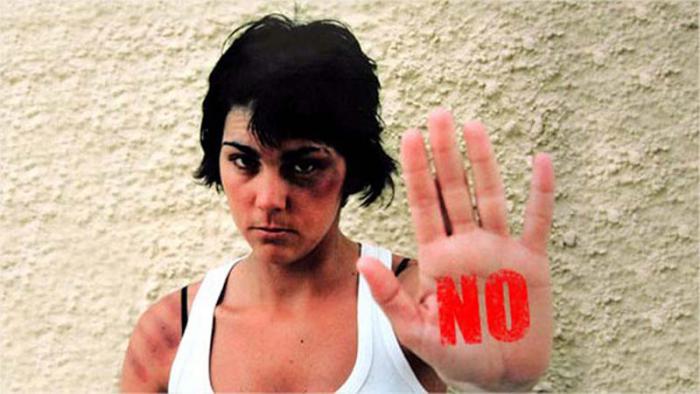
Violence is a problem that concerns everyone, so silence makes us complicit. Photo: Taken from the Internet
This is the name given to the set of attitudes, actions, expressions, speeches and devices of all kinds that aim to control, humiliate, degrade or cause physical, moral, economic, sexual or psychological suffering or harm to a woman just because of her condition. It is a constitutive characteristic of relationships of domination-submission and those who participate in the process occupy the roles of victimizer or victim.
The intention, expressed or underlying, in this type of violence is to control the woman, to deprive her of dignity, self-esteem, autonomy and voice; thus, she is modeled as an extension of man and her entire value lies in the union of beauty and utility, her “respect” for the rules that are set forth, her obedience and her willingness to fulfill basic tasks: home order, companionship, pleasure and reproduction.
The manifestations of violence against women can be either continuous or discontinuous, refined or crude, subtle or evident, charged with anger and the application of physical force (pushing, hitting) or psychological and expressed through silence, disinterest or the devaluation of what the woman thinks or feels. The above-mentioned devices cover all areas and moments in the victim’s life and are presented as a mixture in which there are – acting in conjunction – elements of prevention, “education”, surveillance, control, blackmail, discipline and punishment.
Although the extreme cases (beating, physical attack, rape or femicide) become public – thanks to the intervention of the Law and the mass media – most violence against women is “naturalized” and takes place in the public space, in situations of apparent normality, or “inside” the families, where there are no witnesses. Violence against women denies women the right to decide what kind of intervention they want or accept, what forms of social exchange and even what limits.
Examples of the above are actions with a sexual content such as compliments, unsolicited physical contact, harassment and sexual aggression; discrimination (direct or indirect, at work or otherwise) due to the status of women; threats with respect to child support or power, and the dynamics of patriarchal and androcentric authoritarianism in the family, the workplace or any place in public space and society.
Bibliography consulted (main sources)
El género en el derecho (Gender in Law). Ramiro Ávila Santamaría; Judith Salgado and Lola Valladares (compilation). Quito: Ministry of Justice and Human Rights, 2009.
Gamba, Susana- Diz, Tania. Diccionario de estudios de género y feminismos. Buenos Aires: Biblos, 2007.
Jokin Azpiazu Carballo. Masculinities and feminism. Barcelona: Virus Editorial, 2017.
Straka, Ursula (coordinator). Gender violence. Caracas: Universidad Católica Andrés Bello, Posgrado Área de Derecho; Amnesty International; Reforma Judicial, 2015.
Cuadernos de género: Políticas y acciones de género. Training materials / Marta Aparicio García; Begoña Leyra Fatou and Rosario Ortega Serrano (eds.) Madrid: Instituto Complutense de Estudios Internacionales, 2009.
Lifting Restrictions is Very Dangerous

Lessons from Hokkaido Island to the World:
Lifting Restrictions is Very Dangerous
The region acted quickly and contained the initial outbreak with a three-week quarantine. But when restrictions were lifted, a second wave hit even harder.
April 30, 2020
Translated and edited by Walter Lippmann for CubaNews.
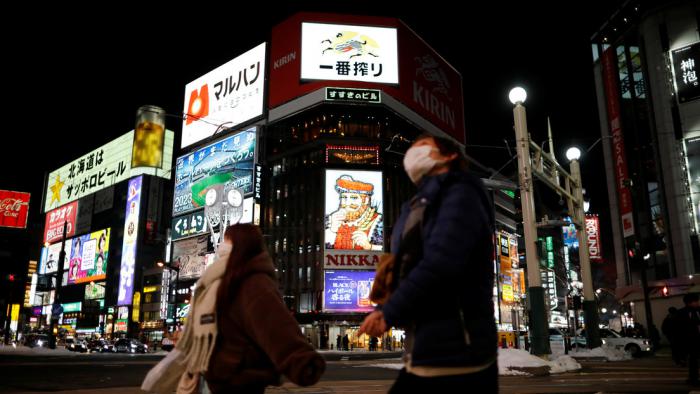
Masked passers-by in Sapporo, Hokkaido, Japan, on February 26, 2020 Photo: Reuters
The island of Hokkaido in northern Japan is experiencing a second wave of coronavirus infections and deaths, which experts say could have been avoided if the state of emergency had not been lifted too soon. Their experience offers a grim lesson for the next phase of the battle against covid-19, TIME reports.
The region acted quickly and contained the initial SARS-CoV-2 outbreak with a three-week quarantine. But when local authorities lifted restrictions, a second wave of infection hit even harder: less than four weeks later, the island was forced to re-implement the blockade.
Hokkaido reported 38 new cases on Tuesday, bringing its total number of infections to 688, the fifth highest in Japan. Simultaneously, one person died from the virus, bringing the number of deaths on the island to 27.
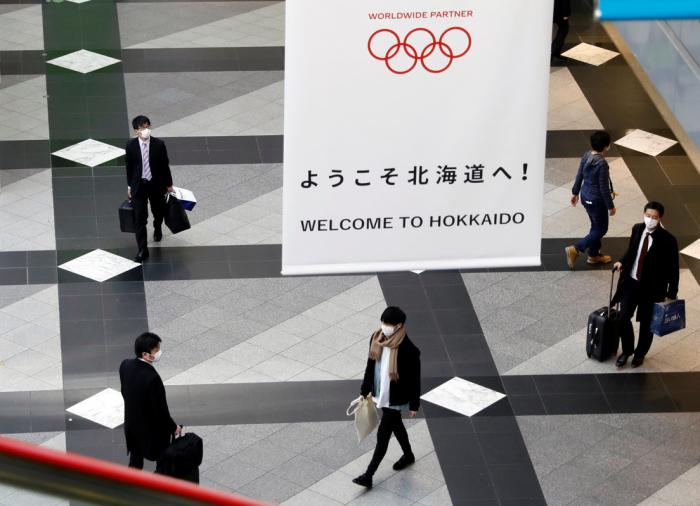
Chitose Airport, Hokkaido, Japan Photo: Reuters
Success Story
Thus, the island, which was seen as something of a success story for the way it worked to contain, track and isolate the virus, is once again in the spotlight as it struggles to cope with the second wave of contagion.
In late February, Hokkaido became the first place in Japan to declare a state of emergency for covid-19. Schools were closed, large-scale meetings were canceled and people were advised to stay home. The local government pursued the virus with determination, isolating anyone who had had contact with those infected.
The strategy apparently worked, and by mid-March, the number of new cases had been reduced to one or two per day. On 19 March, the state of emergency was lifted and schools were reopened in early April. But only 26 days after the state of emergency was lifted, a new one had to be imposed.
It should be noted that Hokkaido has acted independently of the central Government, which only last week placed Tokyo, Osaka and five other prefectures in a state of emergency.
Lifting the restrictions “is very dangerous”.
“Now I regret that we should not have lifted the first state of emergency,” Kiyoshi Nagase, president of the Hokkaido Medical Association, told TIME. “It really won’t be until next year that we can safely lift these blockades.
Experts say the restrictions on the island were lifted too quickly and too soon because of pressure from local businesses, along with a false sense of security about the declining infection rate.
According to Kazuto Suzuki, a professor at Hokkaido University, the example of the island “shows that what is happening in the U.S.,” where some governors are lifting restrictions, “is very dangerous.
“That’s what we know now: even if you control the first wave, you can’t relax,” Suzuki concluded.
(Source: Russia Today)
Cuba Returns 2000+ Stranded Cubans


Cuba guarantees the return of more than two thousand Cubans stranded in 15 countries
Since the beginning of the spread of the pandemic, Cuban Consulates have provided timely information to Cuban nationals abroad on the evolution of the disease on the island and on consular procedures.
April 27, 2020
Translated and edited by Walter Lippmann for CubaNews.
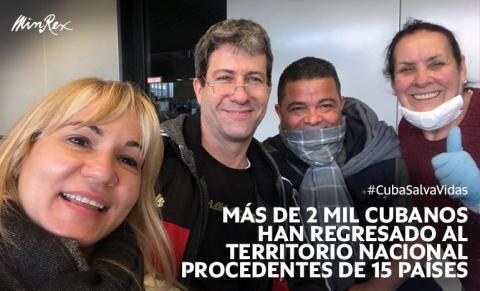
Photo: Cubaminrex
Since the announcement of the regulations on travel to and from Cuba, a measure adopted by the Cuban authorities as part of the national plan for the prevention and confrontation of COVID-19 as of March 20, more than 2,000 Cubans have returned to national territory, by air and sea, from more than a dozen countries, among them: Angola, Barbados, Dominican Republic, Guatemala, Guyana, Haiti, Honduras, Italy, Nicaragua, Peru, Portugal, Mexico, Panama and Equatorial Guinea, Cubaminrex reported.
These return flights of Cuban citizens and foreigners residing on the island have been organized between the competent Cuban authorities and their counterparts in each of the countries involved, in strict compliance with internationally established standards.
Since the beginning of the spread of the pandemic, Cuban Consulates have provided timely information to Cuban nationals abroad on the evolution of the disease on the Island and on consular procedures. At the same time, the Cuban authorities are permanently monitoring the situation of our nationals stranded in different countries, while efforts are being made, whenever possible, to ensure their return to our country.
Equally commendable has been the action of Cuban residents and members of solidarity organizations with Cuba, who have provided food, medicines and arranged cheap accommodations for Cuban citizens who are waiting to return to our national territory.
Pandemic and Spirituality

Pandemic and Spirituality
The coronavirus forces us to assume a new spirituality and attitude towards reality. Spirituality is the capacity to open oneself lovingly to the other, to nature and to God.
By Frei Betto
April 11, 2020
Translated and edited by Walter Lippmann for CubaNews.
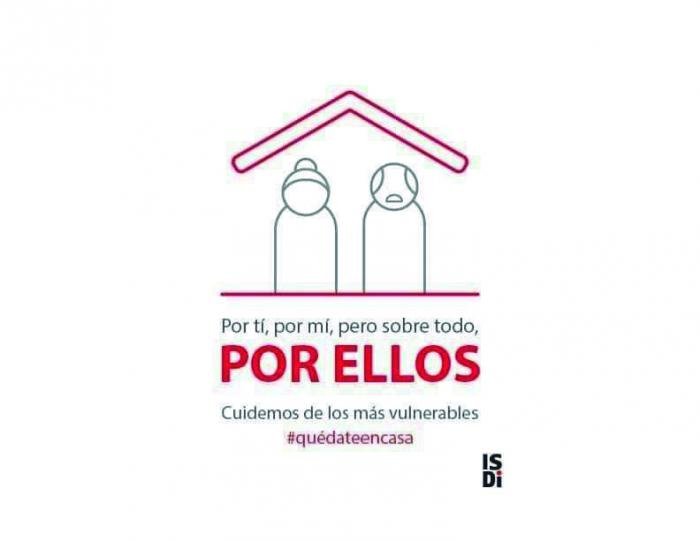
Life is full of contingencies. On a personal level, failure, loss of friends, illness, death. On the global level, events that no analyst or futurologist foresees, such as the fall of the Berlin Wall and the Twin Towers in New York. Nor did anyone suspect that in the midst of the 21st century, with all the resources of science, humanity would be threatened by a pandemic.
Who could have imagined that it would come from China, in the form of a contagious disease, the cause of the deepest crisis of capitalism since 2008? According to the Morgan Stanley Composite Index, in a few weeks in the financial market, the shares of the world’s stock exchanges lost $15.5 trillion dollars, more than eight times the GDP of Brazil in 2019!
Will any of those speculators and mega-researchers be affected in their pockets (the most sensitive part of the human body) have become poorer? And yet, before the pandemic, almost all of them refused to make their own contribution to measures to combat hunger and global warming.
That reminds me of the siege of Jerusalem by the Romans in the year 70. There came a time when the rich man offered a pot full of gold in exchange for a piece of bread.
The coronavirus forces us to assume a new spirituality and attitude towards reality. It does not make class distinctions, as does gastroenteritis, which kills thousands of malnourished children. Likewise, it makes no distinctions of sexual orientation, as does AIDS, which affected mostly homosexuals. Now we are all vulnerable, even if the age groups and situations of risk vary.
We are all forced to withdraw into the house and into ourselves, to become detached. This abandonment of routine activities and programmed agendas can uproot or humanize us. Those who are attached to certain habits that, for the moment, are forbidden, such as going to the movies, to the theater, to the club, will rebel. In the case of the elderly, they will not be able to have contact with their grandchildren and will have to stay at home as long as possible.
Air travel has been reduced, national borders have been closed, tourist tours have been canceled. We have no choice but to stay put where we are. Huit-clos [no exit], within four walls. We may discover, like Sartre, why others are hell. And it may be that we rescue family life, dialogue with the family, the care of the house (everything must be sanitized).
It is time to learn to work and study without leaving domestic space. Now we have more time to watch movies on TV, surf the internet, read good books, do research, meditate and pray.
The virus makes everyone equal. But it doesn’t level the playing field. The bourgeois couple, who never took the trouble to go into the kitchen or clean the house, are now forced to roll up their sleeves or risk having one of their employees bring the virus into their home. The recalcitrant does not follow the instructions of the health authorities, and the selfish buy all the alcohol gel and masks in the pharmacy.
I know a young woman who volunteered to do the shopping for the vulnerable neighbors in her building without charging anything for it. Another distributed her phone number so that isolated elderly people would have someone to talk to. A married couple of lawyers go in their car every morning to pick up their cook on the outskirts and take her back in the afternoon, to prevent her from using public transportation. Three neighboring families from a hospital decided to prepare lunches for the nurses and doctors who double their work hours. In Italy, neighbors look out the window in the late afternoon and sing in chorus. Churches, mosques, synagogues open their doors to those who live on the streets and need hygienic care. Finally, there are countless examples of generosity and solidarity in this period when we are all potentially threatened.
These gestures have their source in spirituality, even if it is not of a religious nature. Spirituality is the capacity to open oneself lovingly to others, to nature and to God. And its best teaching is in generosity, the secret of happiness. Rich is not he who has everything, said Buddha, but he who has need of little.
Public Transportation Makes Adjustments


Public Transport Switches to
Direct Service for Essential Workers
In view of the logical concerns and worries in the population, caused by the paralysis of public transport in the country, Eduardo Rodriguez Davila, Minister of Transport (Mitrans), stressed the importance of understanding, support and discipline towards these provisions, in view of the progress of the new coronavirus
Author: Susana Antón | susana@granma.cu
April 13, 2020 21:04:09
Translated and edited by Merriam Ansara.
Edited by Walter Lippmann for CubaNews.
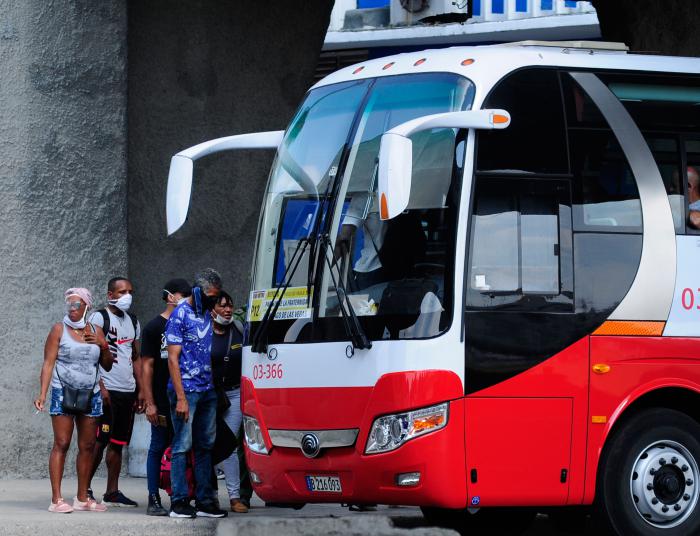
The new measures in transport seek to prevent the spread of VOC-19. Photo: Endrys Correa Vaillant
Responding to the logical questions and concern of the population over the suspension of public transportation in the country, the Minister of Transport, Eduardo Rodriuez Davila, remarked how important it is for people to understand, support and uphold these measures as necessary in the face of advancing COVID-19.
He explained to Granma, that the suspension does not for the moment include state vehicles that are used to ensure the functioning of the economy, nor privately owned personal vehicles which can circulate as needed, so long as they also are not creating traffic jams.
There is still also the movement of cargo, he said, as necessary to support the economy.
He confirmed that the mandatory suspension imposed Saturday, April 11, includes all public transportation both urban and inter-urban, includes both state and privately owned, and includes the support services for state vehicles.
Instead, transportation services have been organized for workers in the medical and health centers, commerce -related services, policing services and others defined by the Defense Councils (Civil Defense) throughout the country as essential activities.
He added that these are for specific workers at specific hours so that they can go and return from their places of work.
He said also that transportation has been guaranteed for all dialysis patients, people undergoing cancer treatments and in other situations of medical urgency. Information telephone lines have been set up at the main health centers in each municipality.
For these services as well, transportation reinforcements have been provided to all of the local defense councils, including ambulances and medi-buses.
He said that all transportation drivers concerned about the situation of their salaries should check with their own work centers which have been put in charge of administering the benefit directives of the Ministry of Labor and Social Security.
In terms of self-employed transporattion workers, Rodriguez Davila said that the current suspension of service applies for the moment to passenger and cargo transportation (including bici-taxis and buggies), and services related to these such as driving instructors and taxi stand managers.
The suspension applies to the operation of vehicles and does not include suspension of related activities such as vehicle repair, bodywork, or tire repair. These can continue so long as it does not lead to any gatherings of multiple individuals and that those involved observe the prescribed infection protection measures.
He said that for any further clarification or needs, workers in these services should direct themselves to the offices from which they have received their licenses.
The MINTRANS minister said he realized that there have had to be huge adjustments from the public transportation of passengers to transportation for designated workers.
All of these newly adjusted services have had to be carried out with strict adherence to measures of zero crowding, everyone wearing facemask, ensuring use of hypochlorite for hands before boarding and complete disinfection of the vehicles after each run.
Each day there will need to be adjustments to improve the new services and to avoid any adverse effects to essential services. He said that instructions had been given to all of the provinces to improve organization of the routes, schedule frequency and other elements that would ensure maximum efficiency of service and conservation of fuel.
He said that MINTRANS was also working with all of the main entities of the central government administration, the defense councils and the state enterprises involved in operation of port-to -transportation to economic distribution so as to guarantee timely distribution of the family ration basket of regular guaranteed goods and other measures to ensure the delivery of food and other basic products to the community.
He remarked that yesterday, Monday, because of the possibity of propagaiion of COVID-19, the Business Group for Automotive Transport Services had decided to close the Schools for Road and Driving Education to avoid gatherings of multiple individuals and had issued an announcement to this effect.
He announced that the deadlines for certificates, license renewals and psychological/physical driver exams for those whose documents were expiring had been extended until services were restarted in the related centers and offices.
Anyone who had already paid for the service at the time of the service suspension, who didn’t wish to continue the service could ask for 100% reimbursement of the amount paid.
Neighborhood Heroines

photo reporting
Neighborhood Heroines (+ videos)
The woman, as always, where they are most needed. The work is enriched by the fruit of her labor
Author: Juvenal Balán Neyra : juvenal@granma.cu
April 6, 2020 18:04:25
Translated and edited by Walter Lippmann for CubaNews.
In the Naroca neighborhood, Boyeros municipality, the dynamics of the current moments of confrontation with the COVID-19, has changed the coming and going of neighbors, the children’s games in the surroundings of the buildings, although some essential services for the population remain vital.
In the apartments the sewing machines are kept in constant movement. Women of all ages spend much of their precious time in front of them. The legs are exercised with the pedal. The eyes are fixed on the passage of the fabric, through the needle, which at a dizzying pace is shaping the nasobuco. Others tidy up and finish them off. In short, there is motivation to create and contribute. It’s time to do.
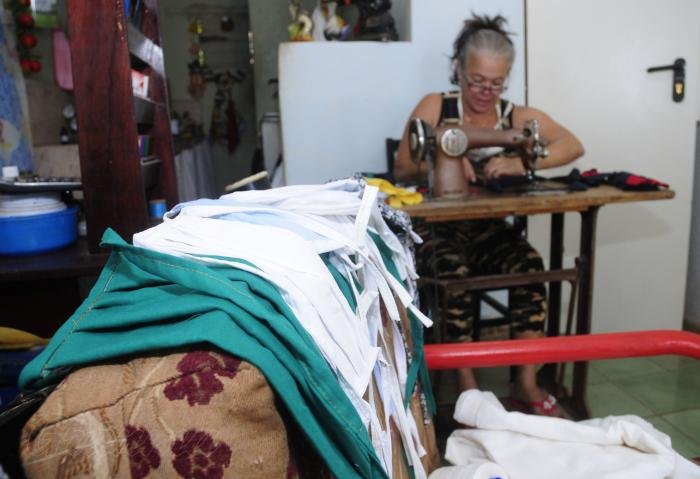
Photos and videos here:
http://www.granma.cu/fotorreportajes/2020-04-06/heroinas-del-barrio-06-04-2020-18-04-25
Irresponsibility Puts Lives at Risk


Irresponsibility Puts Lives at Risk
It is necessary to close every gap where the new coronavirus enters, almost always accompanied by indolence, insensitivity and carelessness.
Author: Ortelio González Martínez | internet@granma.cuApril 8, 2020 23:04:55
Translated and edited by Walter Lippmann for CubaNews.
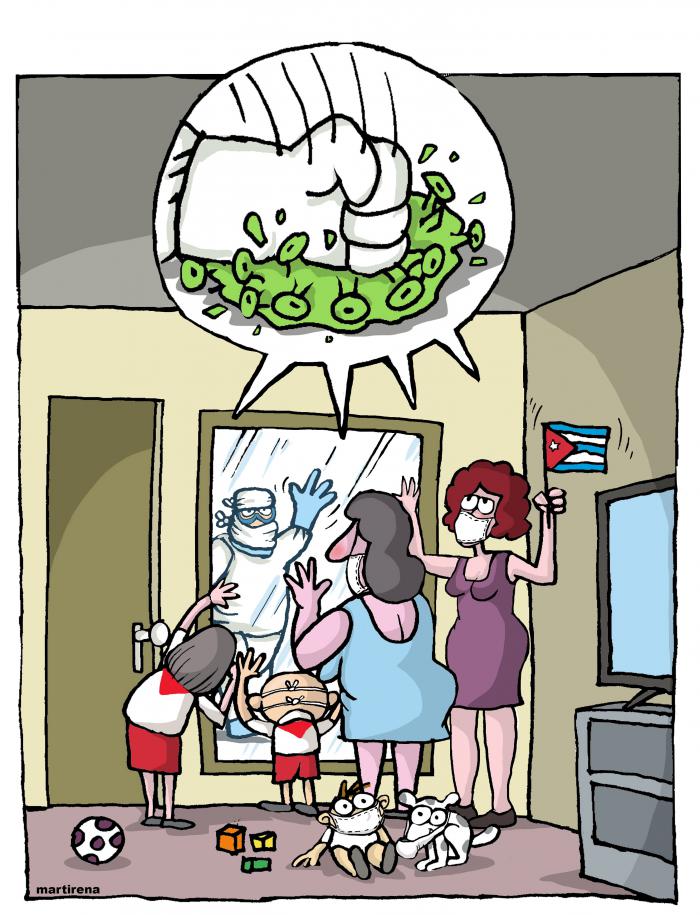
In a farewell celebration in Limpios Grandes, a community of a little more than 200 inhabitants belonging to the territory of Florencia, a traveler from the United States did not imagine that he would leave such a sad mark when, in the second half of March, he returned to his country of origin. There there were several people left infected with the new coronavirus, a figure that today reaches 17 patients, starting with case zero: a young woman who was only 18 years of age confirmed as positive on April 2.
The girl had close ties with the visitor and in turn with relatives in the community, which is why six of those confirmed live here, including some children. Another five confirmed cases are from the Florencia headwaters, allegedly infected at a family party she attended.
The value of the constructive criticism made by President Miguel Díaz-Canel Bermúdez at the meeting to follow up on the plan approved by the Cuban Government for the prevention and control of the new coronavirus on the island is based on the purpose of achieving a favorable change that will benefit each and every one of the people, whether or not they are involved in the current pandemic that is sweeping Cuba.
Without half-measures, he emphasized that “we still have to criticize those who are still reluctant to abide by the discipline necessary to keep the curve of the disease as flat as possible.
“This is not a request,” he said, “it is an obligation that we must assume with citizen responsibility and that must help us fulfill our institutions of internal order that are deployed, along with their people, in these difficult days.
“Life is telling us that, when someone hides information about their health status, we can mourn the loss of a life and we can mourn other lives that are put at risk.
In the face of the new coronavirus, there are no crossed arms in Ciego de Avila. Evaristo González Camacho, provincial director of the Integral Direction of Supervision, confirms figures: 3,727 inspections carried out, 1,862 fines imposed in the amount of 794,165 pesos; 813 warnings and 22 licenses to practice self-employment withdrawn (basically related to price violation).
The Provincial Prosecutor’s Office, for its part, had filed 20 cases as of 2 April, 11 of which were prosecuted as crimes of spreading epidemics, punishable under article 187 of the Criminal Code. These were generally persons who had violated the need for isolation, an extremely irresponsible behavior.
In addition, more than 327,000 investigations are carried out every day by medical and dental students, together with doctors, family nurses and political and mass organizations. “Now the important thing is to go deeper into the quality of the research,” Dr. Osvaldo Ivañez, provincial director of health, said at a press conference.
However, gaps exist. There is still a need to denounce in a timely manner the inappropriate conduct of the people, the people’s council and the on the block, because everything cannot be left to the forces of MININT.
It is necessary to act more rigorously in confronting the illegalities and behaviors that in the midst of the pandemic put people’s lives at risk; a call that the country’s highest leadership never tires of making.
Two people from Ciego de Avila died from sars-CoV-2, in the popular council of Florencia with a local transmission event, as well as the town of Turiguanó, 88 people in the isolation centers and figures with a tendency to grow in several municipalities. These, set off the alarms in the province, located among those with the most diagnosed cases (48) in the country.
It is necessary to close any gap where the new coronavirus enters, almost always accompanied by indolence, insensitivity and lack of concern.
Immunization, But Not Just Against the Virus

double click
Immunization, But Not Just Against the Virus
Let us hope that, once this pandemic is over, the Cuban people will end up being immunized, not only from the virus but also from that other scourge which is disinformation. In this way, we will be closing an important gap for this great historical enemy that is always looking for a way to inoculate its poison.
Author: Michel E. Torres Corona | internet@granma.cu
April 8, 2020 01:04:19
Translated and edited by Walter Lippmann for CubaNews.
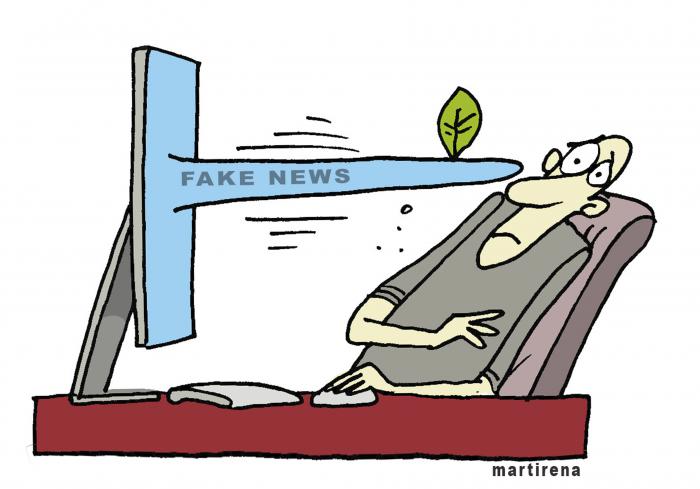
Photo: Martyr
“King, you know I’m a biologist.” That was the beginning of an audio that went viral on social networks, mainly on Whatsapp. Many people shared it, genuinely concerned about the questions that the supposed “biologist” was asking about Cuba’s strategy towards COVID-19.
Then it was Laura, “the one from Calixto”. If Rey’s biologist had previously felt the need to offer her academic credentials, now the new audio that was being circulated started from the very beginning clarifying a link with a public institution, in this case, the Calixto Garcia Hospital.
This new audio no longer questioned the Government’s strategy, but distorted facts and manipulated information to give the image that there was no real control over the confirmed cases and that the Cuban State was not acting with transparency.
“The virus is in the street,” said Laura (“the Calixto’s”), as she slipped in a few alarmist phrases, almost seeking to provoke panic and hysteria among her online “listeners.
But the icing on the cake was a third audio, which also went viral, and this time it was more like a science fiction suspense radio show. There was no longer any talk of the alleged shortcomings of the Cuban health system or of the “negligent” actions of the government.
No: now the story was that of outlaws, persecuted by the PNR, who were disguised as doctors. These alleged criminals would have entered national territory in a boat, deceived the population and instead of giving them medicinal drops, they would infect them with the sars-Cov 2.
All of the above would be humorous material if it weren’t for the fact that Cuba (and the rest of the planet) is facing a pandemic that has taken thousands of lives. But the Law foresees and sanctions this type of behavior.
Our Penal Code establishes a penalty of one to four years in prison for anyone who “spreads false news or malicious predictions tending to cause alarm or discontent in the population, or public disorder.”
Internet access and the use of mobile data, in addition to its obvious benefits, also places new users in an area where hoaxes (or fake news) abound. This vulnerability must be confronted with the timely dissemination of the truth in our media and the call of consciousness to only pay attention to truthful and contrasting information provided by legitimate sources.
In other words: pay more attention to Francisco Durán than to Laura “the one from Calixto”.
Let us hope that, once this pandemic is over, the Cuban people will end up being immunized, not only from the virus but also from that other scourge which is disinformation. In this way, we will be closing an important gap for this great historical enemy that is always looking for a way to inoculate its poison.
The Problem is Capitalism


The problem is Capitalism
Whoever believes that all other systems are worse, look at the blocked and vilified Island, where no one dies of hunger, everyone is guaranteed medical safety and the human being is the center of the system. The problem is capitalism.
By Ernesto Estévez Rams | internet@granma.cu
Translated and edited by Walter Lippmann for CubaNews.
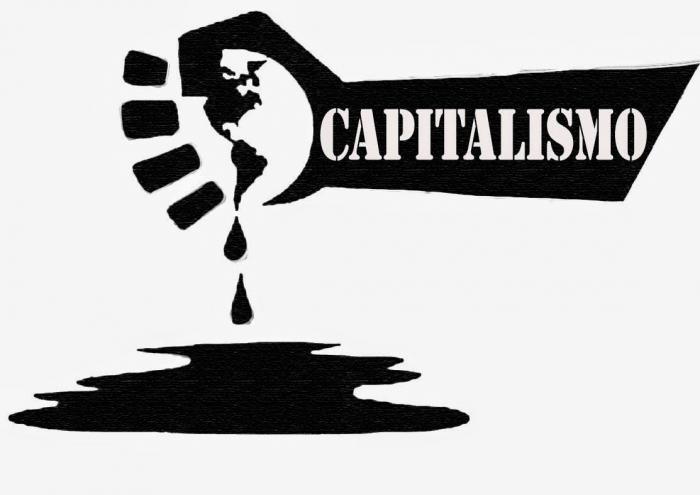
Churchill said that capitalism (he disguised it with the word democracy) was the worst form of government, except for all the others. Something that Eisenhower liked to repeat, who, as a military man, was not exactly known for his profound ideas. The sharp phrase might be clever if it were true, but it is not.
Today, the worst system is capitalism, above all others, of humanity and even of the planet.
This pandemic, unfortunately, only made the reality of it more visible to everyone. Capitalism is incapable of surpassing itself in terms of humanity, it only does so in terms of capital.
While people are dying in the streets, in the US, governors are cheating each other to ensure that the manufacturers of medical instruments sell them their products to the detriment of others. According to New York Governor Andrew Cuomo, ventilation equipment companies are calling government offices to say that their order has been overtaken by another state’s, which has just upgraded its purchase offer. Thus, based on the death of human beings, the companies are seeking to magnify their profits in the midst of tragedy.
The price of ventilation equipment has gone from $25,000 to $40,000, when it is needed most. The state, hospital or institution that does not have enough resources to buy them, simply will not have them, regardless of the cost in lives.
The nice motto that he says is that where some see problems, others see opportunities, is no longer so nice. Governor Cuomo is threatening to sign an order allowing the confiscation of unused medical equipment stored in private spaces for speculative purposes.
That is, people and businesses that keep unused ventilation equipment waiting for the advance of the pandemic to make it more expensive and then sell it to hospitals.
The federal state has been unable to impose a national policy for the distribution of medical equipment and supplies. If they ever do, because of their slowness, the dead will no longer be able to thank them. It is a matter of every person for themselves, typical of capitalism and today seen in all its criminal magnitude.
Practices of pillage that are nothing new, but that in everyday life are hidden behind the mantra that “that is the norm”. But that is not all. European governments confiscate shipments of medical equipment in transit to other European nations. France has confiscated 130,000 nasobucos in transit to the United Kingdom. Germany claims that the US Government has confiscated 200,000 masks that it had already bought from a manufacturer in China, owned by a US company. The shipment was intercepted in Bangkok at an event that German Interior Minister Andreas Geisel called modern piracy’.
Canadian Prime Minister Justin Trudeau complained that a shipment of masks had been reduced because part of it had been repurchased by the U.S. In Turkey, the nasobuco business has become so profitable that the government has confiscated nearly one million clandestine sales in a business that is already estimated to be worth over several million in profits.
The United States, not even for a moral imperative, would help the global fight against the pandemic. Reality shows its inability to do so effectively even in its own home, where Make America Great Again we already know what it [really] means, at the expense of the rest of humanity.
If anything, for the elites, America is 1% at the top of the social pyramid. Capitalism cannot fail to be savage; what happens is that, now, savagery without make-up touches the showcases, where their miseries were hidden behind the prosperity they maintain at the expense of the poorest people.
Frantz Fanon said that fascism was the name given to colonialism when it was brought to the metropolises. Outside of the first world centrality, the horror is lived in Ecuador or another location, which in that scavenging use of language, are usually called peripheral or emerging. Today, in front of the evidence of the medieval nightmare, they do not even mention it.
But it is worth remembering, now that everyone in the metropolises is scared, that the Third World does not escape pandemics. In Africa alone, 30 million people are in life-threatening conditions of hunger, and certainly with consequences for their physical and mental development.
Of the 5.9 million children who die every year in the world, at least half are the direct result of hunger. Oxfam, the author of the above-mentioned data, explains this reality very well: “Hunger is not the result of too many people and too little food. It has to do with power, and its roots lie in the prevailing inequality in access to resources and opportunities”.
Whoever believes that all other systems are worse, look at the blocked and vilified Island, where no one dies of hunger, everyone is guaranteed medical security and the human being is the center of the system.
The problem is capitalism.
Subscribe to Blog via Email
| M | T | W | T | F | S | S |
|---|---|---|---|---|---|---|
| 1 | ||||||
| 2 | 3 | 4 | 5 | 6 | 7 | 8 |
| 9 | 10 | 11 | 12 | 13 | 14 | 15 |
| 16 | 17 | 18 | 19 | 20 | 21 | 22 |
| 23 | 24 | 25 | 26 | 27 | 28 | 29 |
| 30 | 31 | |||||

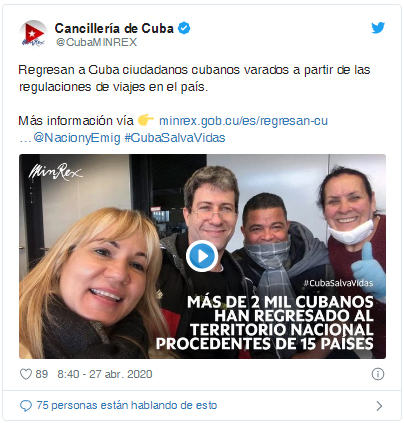
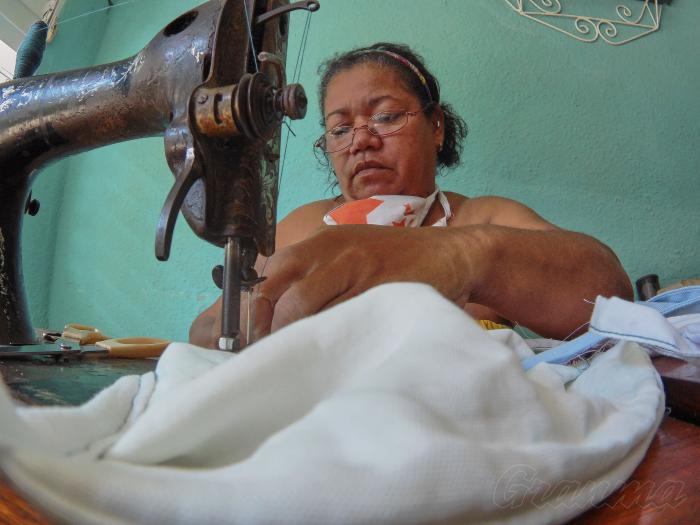
You must be logged in to post a comment.